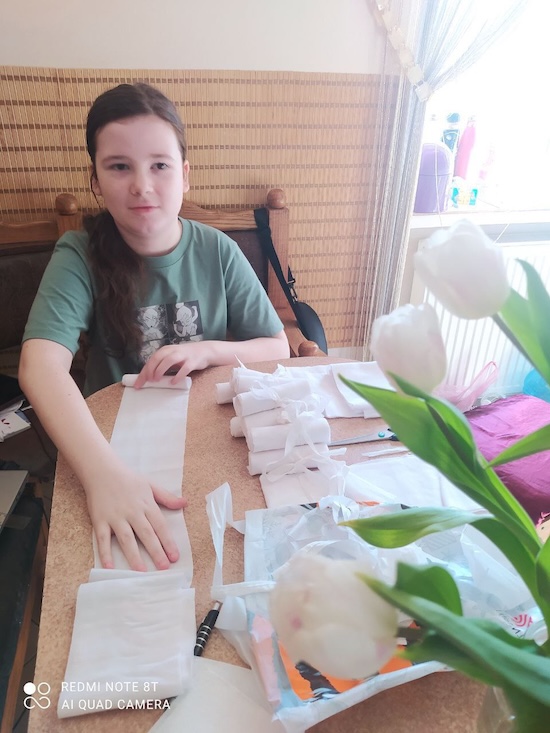
c/o Yaryna Kholod
Since I set out to write this article commemorating three years since Russia attacked my country with all the troops and weapons available, I have changed my mind on what latest news deserves to be part of the introduction paragraph several times. I followed the fight of the first responders and paramedics in Kherson to save a family of four from under the rubble of their apartment building that was targeted by a Russian fighter drone. It was a joy to read the headline about 15 Ukrainian children being returned to their homeland, but it was a pain to see in the later paragraph of the article that 19,546 more children were confirmed to have been deported to Russia from the occupied territories. My phone was bombarded with news notifications of the new administration in the U.S. making countless immoral claims on the war, each of them bringing the U.S. closer to becoming a Russian ally, joining in that rank Belarus, North Korea, and Iran.
I have been told by otherwise incredibly kind and socially aware people that they have blocked the word “Ukraine” from their Google News recommendations because of the stress it brought them. I and other Ukrainians do not have the luxury of keeping these tragedies out of our minds. Instead, we do our best to use our grief and anger to fuel our contributions to the resistance.
To keep the army of the country that has a population three times that of Ukraine from advancing, it was never enough to rely on career military officers. None of our soldiers were made for war, and they could have had successful careers that they put on stop to become part of the army. Most of my favorite writers and musicians are now snipers, infantrymen, or drone operators. My acquaintance from a boot camp, which was organized by the community organization that helped me get into Wesleyan, only worked at a Wall Street firm for about a year after she graduated from NYU when she then decided to become a military paramedic.
Civilians have made the support of the army a part of their routine. Many of us have set a regular percentage of the monthly income we donate to the many organizations that assist those on the frontline, like Come Back Alive. The technological progress of modern warfare often makes it hard for the bureaucracy of the state to react to the new requirements of surviving an attack. Our family friend, a member of the all-women volunteer NGO, shared at Christmas dinner her newly gained knowledge that simple first-point view drones no longer cut it. Instead, we must move towards FPV drones with optical fiber because they cannot be jammed.
Russian unprovoked aggression forced even children to learn the differences between the explosions caused by missiles, cruise or ballistic, or fighter drones. The kids on the playground in front of my apartment building have developed a habit of screaming ferociously so that they could drown out the sounds of the air raid siren. It is hard for the adults to convince them of the need to go to a bomb shelter or explain why they could not go to school and socialize with their peers regularly until one was built next to the school building. Still, even children do their bit by helping to weave camouflage nets and prepare medical supplies. My younger sister Khrystia has become particularly fast at rolling bandages for personal first aid kits.
Ukrainian cities, even those far from the frontline, carry the signs of being part of the country at war. A large part of the central square of my hometown is occupied by masts with Ukrainian flags and photos of the fallen soldiers attached to them. This scene is so vivid with details in my head that I notice every single new flagpole appearing from afar even when running to the bus at the station nearby.
I have recently visited the Saint George Cathedral in Lviv. It is almost three hundred years old, but still, it looks quite different now, with all of its sculptures covered up by gray bags with isolating material meant to protect them from the explosion wave if there is a bombing close to the building. What struck me even more, however, was an exhibition about the Greek Catholic priests, nuns, monks, and simple believers who were arrested by the Soviet KGB, often tortured, and sent to concentration camps in Siberia and elsewhere because the denomination was deemed too closely tied to the Ukrainian identity in the Western regions. I thought about the territories that were liberated and where numerous torture chambers were found along with civilians captured there, and the territories that are still occupied by Russia where the number of victims is still unknown. There aren’t many Catholics in the East and the South, but there are other groups targeted by the modern Russian army, like journalists, human rights activists, teachers, LGBTQ+ people, or even simply Ukrainians who insist on speaking the Ukrainian language.
While facing the challenges and losses, Ukrainians are still continuing to stand up to tyranny and defending our right to be Ukrainian. We will not give up on any part of our country because we know the horrors of what happens in occupation. There is a high chance that it might get even harder, but I believe that my country will get through that thanks to all the people doing routine daily work that makes up a heroic fight.
Yaryna Kholod is a member of the class of 2028 and can be reached at ykholod@wesleyan.edu.